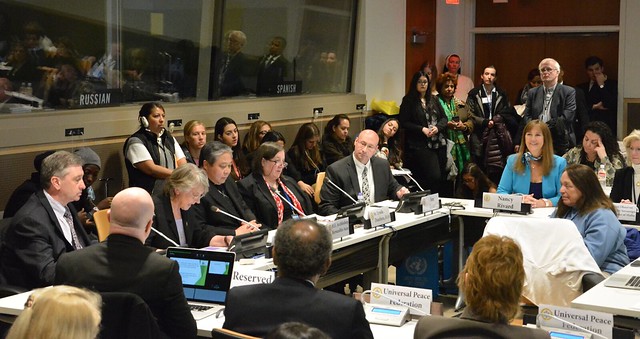New York, United States—During the 2017 Commission on the Status of Women, a program was held at the United Nations headquarters entitled “Economically Empowering Trafficking Survivors to Stay Permanently off the Streets.”
The program was sponsored on March 22, 2017, by the Holy See Mission together with the Permanent Observer Mission of the Order of Malta and the Universal Peace Federation.
Acting as the program moderator, Archbishop Bernardito Auza, the permanent observer of the Holy See Mission to the United Nations, described human trafficking as “one of the darkest and most revolting tragedies in our day.” The UN event, he said, would show how several organizations have overcome challenges to rescue those who have been ensnared by this brutal slavery.
The first panelist, Sister Lynda Dearlove, the founder of the London organization Women@theWell, spoke about the often overlooked need that women who have suffered in prostitution and trafficking have for spiritual and emotional healing. The women who don’t have this healing are more vulnerable to returning to prostitution, she said.
In addition, these women need marketing skills, mental health support and education, Sister Dearlove said. She stressed that the focus of policies needs to shift away from blaming and criminalizing the exploited women to addressing the root problem, which is the male demand. This should be done by deterring procurers as well as those who buy sex and use pornography. “Demand is everywhere,” she said, “and our only way of tackling prostitution and the trafficking of women is to universally tackle demand. What is fueling demand is the attitude that it is OK that women’s bodies are commodified.”
The next speaker, Nancy Rivard, founded Airline Ambassadors International, a group of more than 8,000 airline employees who advocate for trafficking victims and are trained to spot trafficking perpetrators and victims while in transit. Besides intervening in and preventing trafficking, this organization has persuaded airlines and other travel industries to provide job training for and hire trafficking survivors. Ms. Rivard related the experiences of two once-trafficked women who are now excellent flight attendants for American Airlines.
Sister Joan Dawber, the founder and executive director of LifeWay Network, spoke about her organization’s safe housing and education, which enable trafficking survivors to leave the streets. She explained that her organization in New York City offers a community-living situation which facilitates the needed emotional healing. She said that their housing is uniquely offered to both domestic and international survivors.
Next on the panel, Jon Lines, the executive vice president of Operation Underground Railroad (OUR), described how his organization partners with local law enforcement around the world to arrest traffickers and free their victims. He showed a compelling video of more than 650 trafficked children being rescued and hundreds of traffickers being arrested. Mr. Lines gave examples of survivors receiving skills training, employment and safe housing after they have been freed. He pointed out that the emotional devastation of trafficking abuse requires an investment of sensitive encouragement and emotional support. Speaking of victims’ feeling of hopelessness, he recalled a young girl survivor. When asked what she wanted to be when she grew up, the young girl responded, “I never really thought about growing up, because I never thought I was going to.” Mr. Lines added that after much care, support and education, this young lady eventually became a successful sous chef.
Peter DiMarzio, a specialist at the U.S. Department of Homeland Security for assisting victims of trafficking, was the final panelist. He explained that drug addiction is one of the greatest obstacles to leaving the streets and gaining stable employment. One complication is that survivors must have overcome their drug addiction before they can be accepted into most safe houses, he said. Not all detox programs last long enough to be effective, he said, adding that partnerships with hospitals to provide detox regimens are invaluable for long-term recovery.
At the close there were a few minutes for questions and answers. Archbishop Auza expressed appreciation for the expert panel and the co-sponsorship of the Mission of Malta and UPF.

